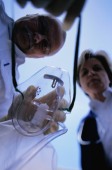
FRIDAY, June 25 (HealthDay News) — Inhalation of the “rotten eggs” gas hydrogen sulfide may be able to reduce or perhaps prevent lung injury in critically ill patients who are on mechanical ventilators, early research in mice suggests.
While mechanical ventilators can save lives, they can also injure healthy lungs or worsen already injured lungs by disrupting lung tissue, according to the authors of a new study.
“Invasive mechanical ventilation leads to inflammation not only in the lung but in many organs, possibly resulting in multiple organ failure. These problems are still not resolved, and we urgently need new strategies to limit side effects associated with mechanical ventilation,” study author Dr. Alexander Hoetzel, of the University Hospital Freiburg, Germany, said in an American Society of Anesthesiologists news release.
This study looked at hydrogen sulfide, a gas that smells like rotten eggs and has been shown to induce a suspended animation-like state that helps protect the body’s organs.
Hoetzel and colleagues found that giving a low concentration of inhaled hydrogen sulfide to mice on mechanical ventilators reduced organ inflammation.
The results, published in the July issue of the journal Anesthesiology, suggest potential for the use of hydrogen sulfide.
“We demonstrated that application of this gas can prevent organ injury. And clinical trials could resolve the question as to whether hydrogen sulfide might exert beneficial effects in patients who depend on ventilator support,” Hoetzel said in the news release.
More information
The Society of Critical Care Medicine has more about critical care.

